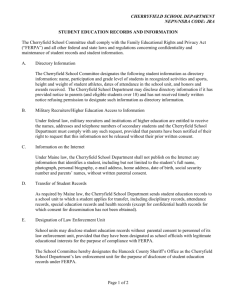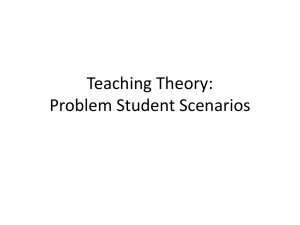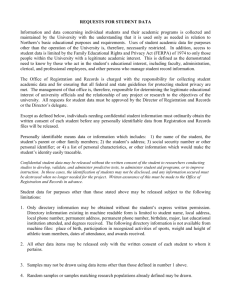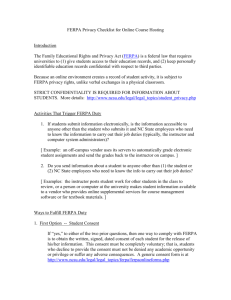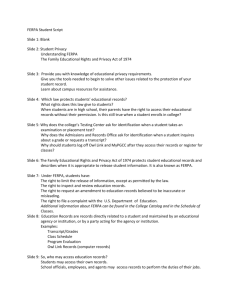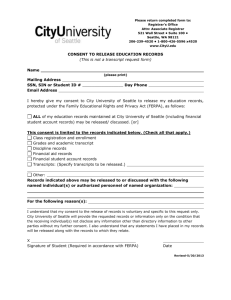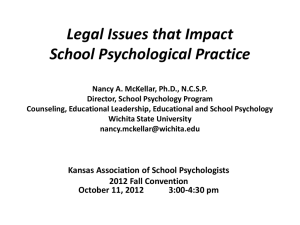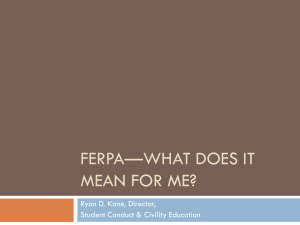Care of Students With Diabetes Health & Safety Code Ch. 168
advertisement
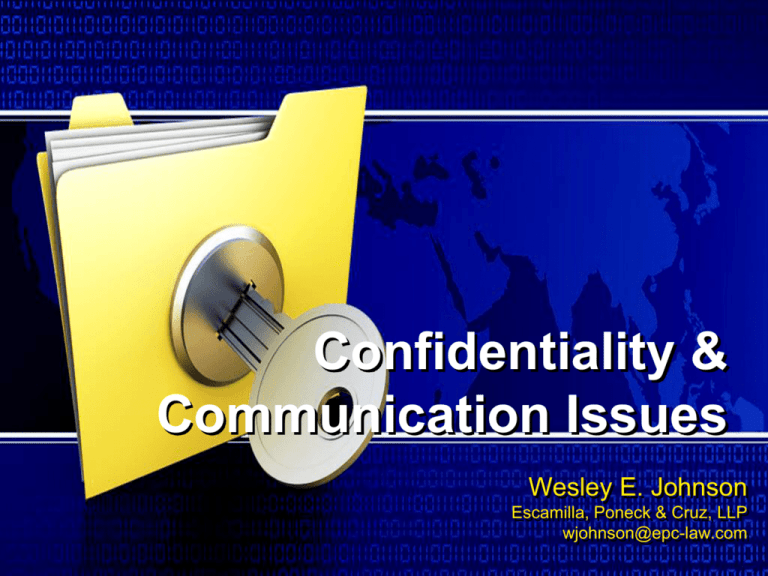
Confidentiality & Communication Issues Wesley E. Johnson Escamilla, Poneck & Cruz, LLP wjohnson@epc-law.com Within first five minutes of your Monday morning, you have already had to handle four different interesting situations: • #1 – Mary’s mother calls to request information regarding Mary’s demeanor at school this morning. Mary had a terrible weekend and has been depressed lately. Her mother asks that you call her later to discuss your thoughts with her after talking to Mary. • #2 – The assistant principal brings you in some papers that were served to the school at the end of the day on Friday. You and the assistant principal have been served a subpoena duces tecum which means that records have been subpoenaed by Eduardo’s father in a nasty custody battle. • #3 – You receive a request to answer questions from a news reporter regarding a former student who is now famous. • #4 – Suzie Q comes to your office worried about her boyfriend’s drug use. You are also worried about him and you talk to the school’s principal about your concerns. He suggests that you call the local police. Laws: • Texas Statutes • Federal Laws • Caselaw from 5th Circuit and other circuits • Attorney General Opinions • Commissioner of Education Opinions • Certification Boards Generated and Maintained in School Setting Likely to be Education Records • Professionals in school setting must therefore be familiar with laws related to education records • Common ideas behind all related laws • Confidentiality • Parental Access Numerous Laws Involved Here: • Texas Public Information Act (TPIA) – Tex. Gov’t Code, Ch. 552 • FERPA (Family Educational Rights and Privacy Act) – 20 USC 1232g • Individuals With Disabilities Education Improvement Act (IDEIA) • HIPAA – Health Insurance Portability and Accountability Act • Records Retention Laws Texas Public Information Act • Share everything unless confidential or exception applies • “Public has a right to know” • Freedom of Information Act (Federal Law) • Previously, Student Records, Tex. Gov’t Code 552.114 Exception • Information in a student record at an educational institution funded wholly or partly by state revenue = confidential • But shall be made available on the request of: (1) educational institution personnel; (2) the student involved or the student's parent, legal guardian, or spouse; or (3) a person conducting a child abuse investigation required by Subchapter D, Chapter 261, Family Code. What You Probably Already Know… • FERPA – Family Educational Rights and Privacy Act - federal law governs education records • “Education records” = records, files, documents, and other materials that contain information directly related to a student and maintained by an education agency or institution or by a person acting for such agency or institution. • Records can be released to parents or eligible students or to others if written parent consent provided • No need for written consent if: – School officials with legitimate educational interest – Directory Information – Sole Possession Records Family Educational Rights and Privacy Act (FERPA), 20 USC 1232g • Intended to protect rights of students and parents • Three basic rights: • Right of parent to inspect and review education records • Right to challenge & require amendment of education records • Right to require written consent prior to disclosure of personally identifiable information education records FERPA Defines “Parents” • Natural parent • Guardian • Individual acting as parent in the absence of a parent Defining “Educational Records”: • Records Pertaining Directly To Student; AND • Maintained By Or On Behalf Of School District STUDENT EDUCATION RECORDS: FERPA • Attendance Records • Psychological Testing • Discipline Records • Behavior Logs • Counseling Records • Class Work • Report Cards • Awards Received • Standardized Test Results • Special Education Records • Health Records • E-mails • Teacher Evaluations “Educational Records”= Info Recorded In Any Way: • Print • Handwriting • Computer Media • Video or Audio Tape • Film • Microfiche • Microfilm Right to Inspection Includes Electronic Data • Cannot answer – no because it is only on my computer • 1996 amendment to definition of “record” to add term “computer media” • How to inspect is local decision • Print a hard copy? • Otherwise allow for review… Who is the District’s Custodian of Records? • Look to FL (LOCAL) • Typically the principal is custodian of records for currently enrolled students • Superintendent – those having withdrawn or graduated • Student handbook has information. Information in an electronic data base is a record • FERPA – any information recorded in any way, including but not limited to, handwriting, print, computer media, video or audio tape, film, microfilm, and microfiche • TEC 26.004 – Parent entitled to access to all written records concerning student including…(8) health and immunization records Internet Access • District policy – provide parents who lived outside of commuting distance of school district the opportunity to review student records via Internet rather than provide a hard copy of records • Opportunity to inspect and review within 45 days is key • Letter re: Broward County Pub. Schs., 11 FAB 18 (FPCO 2007) What if Request is Made Via E-mail? • Letter to Anonymous, 11 FAB 7 (FPCO 2007) • Parent e-mailed request for student records • Safeguards can be used to prevent unauthorized disclosure to 3rd parties • District merely requested additional identifying information prior to sending records School Health and Medical Records • Copies of medical records outside school setting become education records when submitted to school and in school’s possession • Content is not issue • Maintenance is the issue • Screenings or exams • Assistance in school health office • Resulting documentation – education record to extent that it is maintained by district What if Student Wants to Prevent Review of Student Records by Parents? • Law has no waiver component • Parents may review until 18 years of age • Exceptions? • Suspected abuse? • Counseling? • HIV Status (Health & Safety Code 81.103) • Drug and Alcohol Patient Treatment? Parent Right to Inspect Counseling Records • Texas Attorney General Opinion JC-0538 (2002) • Apparent conflict between TEC 26.004 Health and Safety Code 611.0045 • Only under narrow circumstances = records may be withheld • Only LPC have privilege Parent Consent Must be in Writing… • 2004 Regulation • Signed and dated written consent can be in electronic format if: • It IDs & authenticates particular person as the source • Indicates the person’s approval of the information contained in the consent • Technology neutral in time of technological change Countdown of the 12 Ways that Student Records May be accessed Without Parental Consent: • #1 To Teachers or Other District Officials With a Legitimate Educational Interest • #2 To officials of another school system or school where the student seeks to enroll or has enrolled. • #3. To authorized representatives of the U.S. comptroller general, the federal education secretary, or state and local educational authorities. • #4. In connection with the application for or receipt of financial aid. • #5. To state and local juvenile justice systems or their officials. • #6. To organizations conducting educational studies. • #7. To accrediting organizations. • #8. To parents of an eligible student considered a dependent student under the Internal Revenue Code. • #9. In compliance with a judicial order or lawfully issued subpoena. • #10. In connection with a health or safety emergency. • #11. Information is designated as directory information. • #12. To the parents of a non-eligible student or to an eligible student Additionally -- some records are specifically not education records • Sole Possession records • Law Enforcement Records • Grades on Peer Graded Papers • Specifically designated postsecondary records • Records created after student no longer in attendance and not related to student’s attendance #1 To Teachers or Other District Officials With a Legitimate Educational Interest • School Officials= person employed by the school as an: • Administrator, • Supervisor, • Instructor, or • Support staff member (including health or medical staff and law enforcement unit personnel); • A person serving on the School Board; • A person or company with whom the School has contracted as its agent to provide a service instead of using its own employees or officials (such as an attorney, auditor, medical consultant, or therapist); or • A parent or student serving on an official committee, such as a disciplinary or grievance committee, or assisting another school official in performing his or her tasks. Other party to whom an agency or institution has outsourced institutional services or functions can be a “school official” if: • They perform an institutional service or function for which the agency or institution would otherwise use employees; • Is under the direct control of the agency or institution with respect to the use and maintenance of education records; and • Is subject to FERPA requirements governing use and redisclosure of personally identifiable information from education records What About Outside Consultant Hired to Consult With Staff Regarding Student? • Okay. • Contracted with District to perform official task • Had “legitimate educational interest” • Acting within the duties of school official • Letter to Anonymous, 11 FAB 5 (FPCO 2007) • Proposed regulations designed to clarify this Outsourcing • Expands “school official exception” to include contractors, consultants, volunteers, and other outside parties to whom educational institution has outsourced institutional services or functions that it would otherwise use employees to perform • Outside party must be under direct control of agency or institution and subject to same use and redisclosure rules regarding education records • Annual FERPA notice must specify outside parties • District remains responsible for their actions • Only question…what is “direct control”? Letter to Hollingsworth, 10 FAB 40 (FPCO 2007) • Suicide prevention program specialist (not employed with district) wanted to discuss suicidal students with staff as part of her program without consent from parents. • School officials could provide information regarding own observations BUT • Not permitted to disclose information (even names) contained in education records w/o written parental consent • BE CAREFUL! McGilvray v. Boyd ISD, TEA Dkt. No. 185-R2-597 (Comm’r Dec. 1997) • Juvenile probation office to speak to 6th graders • Peer pressure, gangs, drugs and alcohol • Teacher prepared a list of students with attitude problems • “Thoughtless, disresept [sic], rude, selfish, uncaring” • Mere fact that officer was coming to campus to make presentation does not make him a school official for FERPA Investigations/Grievances/Personnel Matters… • Investigation materials often include student records: • Many, if not all requests for documents by SBEC, will seek investigation materials and student records. • Unfortunately, the only FERPA exception that would authorize state agencies such as SBEC/TEA to receive student information without parental consent is if the state agency were auditing or evaluating federally supported education programs or enforcing federal legal requirements related to such programs. • Therefore, if parental consent is not obtained, the information should not be released and SBEC should be told that the District is withholding the student information pursuant to FERPA. • It should also be pointed out that the phrase “school official” = local school district official and does not = SBEC/TEA. • Subject of proposed regulations Austin ISD v. Cruz, TEA Dkt. No. 024-LH1109 (Comm’r Dec. 2010) • Good Cause for termination of contract • Wonderful evaluations • Employed with District 37 years (since 1973) • Right to retain student information? • Right to transmit and reveal student information to her own attorney as part of a grievance? • Right to transmit and reveal student information to employees who were not directly involved with education of student, but were HR staff dealing with personnel evaluation & grievance? Legitimate Educational Interest • FL (LOCAL) • “Need to Know” Test • Access to documents can be through a subpoena • Redaction of confidential portions of student information • Consistent with Everton v. Round Rock ISD, TEA Dkt. No. 070-R2-1091 (Comm’r Dec. 1996) Everton v. Round Rock ISD, TEA Dkt. No. 070-R2-1091 (Comm’r Dec. 1996) • Termination case with a laundry list of conduct – none of which was found to be good cause for termination EXCEPT • Tape recording parent teacher conference • Contained personally identifiable information • Maintained by the District • Education record – limited disclosure • Remember what context the parent has consented to the use of the record • Release of tape-recording also violated Code of Ethics and Standard Practices as a Breach of Student Confidentiality • Alone = Good Cause to terminate Subpoenas • Always notify records custodian (or your immediate supervisor) if your school records are subject to a subpoena • Subpoena Duces Tecum • Advance Notification Requirements • Letter to Ellinger, 13FAB 28 (FPCO 2009) FERPA Broadly defines “Law Enforcement Record” • Not just about content • Created by law enforcement • Created for law enforcement purpose • Maintained by law enforcement unit • If law enforcement record then it is NOT a FERPA protected education record • AND may be disclosed to 3rd parties without parental consent • No FERPA rights for parents (rt to inspect, amend, etc.) • Also subject to TPIA! Law Enforcement Record or Education Record? • Teacher observes student who appears to be sick and about to vomit. He sends her to nurse who evaluates and determines that student is under the influence of a chemical substance. • Nurse sends an internal e-mail to assistant principal • Later, it is learned that the student purchased prescription drugs in the B Hall bathroom that same day and that a group of students are dealing drugs in bathroom during class. • Legitimate search is made. Evidence is revealed. Arrests are made. • E-mail from nurse is requested by both parties. Which is Which? • Nurse’s report – Education Record • Even after provided to law enforcement unit • Not subject to TPIA • Other documentation gathered by law enforcement unit = Not education record • Information from law enforcement records can be shared with outside agencies • How can education records be shared? When Can Information in Student Records Be Disclosed? • Can be disclosed to school officials in other schools who have a legitimate educational interest in the student • When Subpoenaed • Health and Safety Emergency Exception – To appropriate parties in connection with an emergency if knowledge of the information is necessary to protect the health or safety of the student or other individuals. Health and Safety Emergency • Another exception to FERPA • Requires Imminence • No blanket release of information from student’s education records • Consider the following when determining whether H & S emergency exists: – Immediacy, – Magnitude and – Specificity of the information concerning the emergency Health & Safety Emergency • In an emergency, FERPA permits school officials to disclose education records without consent, including personally identifiable information from those records, to protect the health or safety of students or other individuals. • At such times, records and information may be released to appropriate parties such as law enforcement officials, public health officials, and trained medical personnel. See 34 CFR § 99.31(a)(10) and § 99.36. • This exception is limited to the period of the emergency and generally does not allow for a blanket release of personally identifiable information from a student's education records. Why Disclose? • The Department of Education has stated: • To avert or diffuse serious threats to the safety or health of a student or other individuals. • Typically = law enforcement officials, public health officials, and trained medical personnel • But “appropriate parties” = parties whose knowledge of the information is necessary to provide immediate protection of the health and safety of the student or other individuals. • What should be documented? • Explanation of the emergency nature of the disclosure should be documented and maintained in the event that a complaint to the FPCO regarding a FERPA violation is made. • Family Policy Compliance Office telephone number is 202-2603887 So What Meets This Exception? • Special education director discloses information to student’s doctor, without first obtaining written parental consent • Protocol for Diabetes-Hypoglycemic Reaction for Johnny Smith • Parent complained • Health & Safety Emergency? • Irvine Unified Sch. Dist., 23 IDELR 1077 (FPCO 1996) Each Set of Circumstances Matters! • Student going into what appears to be a diabetic coma • Medical personnel arrive on scene • School nurse discloses information from IHP • Parents allege improper disclosure • Health and Safety Emergency? • Letter re: Pioneer Sch., 11 FAB 17 (FPCO 2007) • “The District should also document their analysis of why an emergency exists.” – Presentation by Leroy Rooker, Director of FPCO, July 16, 2002 Proposed Regulations Regarding Health & Safety Emergencies • Proposed language removes strict construction of exception • Adds provision that district may take into consideration the totality of the circumstances pertaining to a threat to the safety or health of a student or other individuals • Articulable & significant threat = disclosure is okay • To any person whose knowledge of the info. is necessary to protect How Does District Defend Position? • Need a rational basis for the determination • DOE has stated that it will not substitute its judgment for school district’s judgment • Their evaluation will not involve substitution of judgment • So…much needed flexibility BUT • Documentation is KEY Sole Possession Records • Little to go on to assist in defining this term • Kept in sole possession of maker; used as personal memory aid; not accessible or revealed to anyone except temporary substitute • Right to withhold records using this exception is the District’s rather than employee’s • Intent to share documents is key – • Where they are kept which = just one component • However, left where others can view = Not sole possession • Affirmative duty on record possessor • Access to computer terminal…. Release or Don’t Release? • District is involved in lawsuit with teacher who abused children in class. District hires outside psychologist to interview children. Parents agree knowing that this will help terminate teacher. Any information related to need for therapy was agreed to be shared. Parent later requests access to notes of outside psychologist. • Pyschologist says no – sole possession records. He kept notes at home. • Not enough. At outset, notes were intended to be shared with others pursuant to district’s agreement with parents. • Additionally, any right to bar access belongs to district – not outside psychologist. Personal Knowledge or Observation • Important to remember that information should not derive from information contained within education record • “Still doesn’t have immunizations.” • “Has been on X medicine entire year.” • “Appeared groggy and lethargic when I observed her this morning” Directory Information • Name, address, phone number, etc. • “Opt out” opportunity • State law requires more • Specific type point • Specific language Individuals With Disabilities Education Improvement Act (IDEIA) • Parents must be afforded opportunity to inspect and review all education records with respect to….provision of FAPE (34 CFR 300.501) • E-mail notices are specifically mentioned in statute (34 CFR 300.505) Letter re: Vermont Immunization Registry, 105 LRP 25701 (FPCO 2005) • State Health Dept wanted to create a centralized database • FERPA applies -- school nurses cannot disclose to the registry the immunization information w/o prior written consent • Health & Safety Emergency Exception does not apply • “To prevent or control an outbreak or epidemic of measles, rubella, mumps, polio or other serious infectious disease that may cause injury or death.” Health Insurance Portability and Accountability • Addresses electronic transmission of Protected Health Information (PHI) • Specifically excludes education records covered by FERPA • Immunization records • Student health records – if not education records under FERPA, and if transmitted electronically, school nurses and health department should follow HIPAA rules. More HIPAA… • School based health clinics run by outside entities • Medicaid. A district that files Medicaid claims electronically, including billing and eligibility information, must abide by HIPAA regulations for all transmissions not covered by FERPA. • Paper claims are not covered by HIPAA. Medicaid Billing: • Patients have a right to know to whom their information was disclosed up to six years after the disclosure. • If a school district is a covered entity, the district must give out a notice of privacy practices to parents of students whose health information is submitted electronically. • Notice of Privacy Practices – Must Send if you are “Covered Entity” • Covered Entity = transmits individually identifiable health information electronically What About Destruction of Records? • Records retention laws apply • Federal requirement that recipients of federal funds retain records for compliance reviews • At least three years after the completion of the activity for which the funds are used • No other real instructions – state and local decisionmaking • Texas Records Retention – SD (LOCAL) Local Schedule SD • Gov’t Code 441.158 • Mandatory minimum retention periods • No disposal prior to expiration of retention period • E-mails & other electronic data are public records • Even if confidential! Retention of Computer Records • Electronically stored data used to create, in any manner, a record or the functional equivalent of a record as described in this schedule must be retained, along with the hardware and software necessary to access the data, for the retention period assigned to the record, unless backup copies of the data generated from electronic storage are retained in paper or on microfilm for the retention period • Texas State Library and Archive Commission • Criminal Penalties & Fines for early destruction – – Tex. Gov’t Code § 552.351 Part 5 – Health Records • Accident Reports – 5 yrs or 2 yrs after age 18 • Activity & Statistical reports (daily and other periodic activity reports compiled by school nurse or nurse extenders related to student health matters)-3 years • Correspondence with Parents or Guardians concerning student health matters – 2 years • Cumulative Health Card – DOW + 2 yrs • Emergency Cards – US or until student ceases enrollment & Exempt from destruction request More Health Records: • Immunization exclusion documents • Health Screening docs – AV after entry on cumulative record • Immunization record – DOW + 2 yrs (retention note for school nurse immunizations) • Reports to Enforcement Agencies (CPS reports, communicable disease, dog bites, drug offenses, missing children, or sexually transmitted disease transmitted to Tx Dept of Health & Human Service or local law enforcement and animal control) – 2 yrs • Special Health Care Records • Physician referrals & reports (AV after entry on • Special medications – 3yrs cumulative record) • Parent requests & physician authorization for specialized Be Careful When Destroying E-Mails • Other laws might apply • IDEA requires notice to parent prior to destroying education records • Prior to e-mail deletion must notify parents that records are no longer needed • 13 FAB 10 (SEA NV 2009) The End
